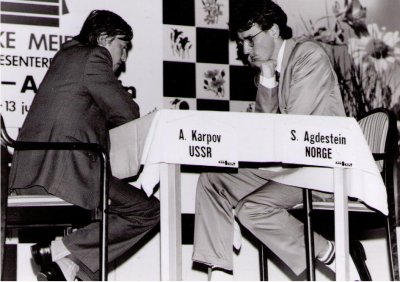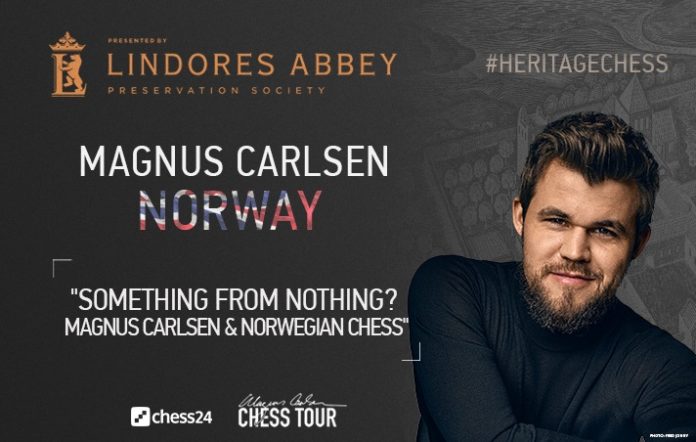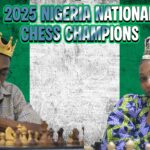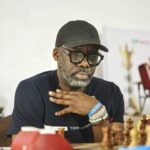Magnus Carlsen has dominated chess rating lists, tournament victories and headlines for a good decade now, so most of his story has been told. Fans and followers feel like they know him – after all, he is high profile and continues to answer questions with almost worrying honesty. People even have an impression of the impact he’s had on little Norway. What might be missing from the tale is a bit of history and context… GM Jonathan Tisdall looks at where Magnus came from in the 11th installment of the #HeritageChess campaign, supported by the Lindores Abbey Preservation Society.
I remember the story of how the greatest Dane, the legendary Bent Larsen, gave a testimonial speech honoring his country’s next chess hero, Curt Hansen. Bent reportedly gave a wild ride of a talk, starting by comparing medieval amazement with the emergence of worms from old meat to the appearance of Curt’s world class talent from a tiny Danish village – ‘Something from nothing!’ Larsen exclaimed.
Svein Johannessen facing the Danish giant Bent Larsen in the Zonal Tournament in Anelo in 1960 | photo: Wim van Rossem / Anefo / Wikimedia Commons
I’m not sure what followed after this bit of imagery, but to me the moral now is that ‘there’s always something’. Bent himself made Curt possible, and to some extent, Magnus as well. It’s easy to be amazed by a great world champion springing forth from a remote country with a small population and even less apparent chess culture, but there is usually an explanation.
Following the trail
Larsen’s friend and contemporary in Norway was one Arnold Eikrem, someone who is probably already fading from memory in our fast-paced world. Arnold’s remarkable chess talent was as an organizer, and he dedicated much of his life to an endless cycle of international events that eventually settled in Gausdal. This skiing hamlet, appropriately tiny and remote, actually became known as a ‘chess Mecca’, with a generation of top international players making a visit, tempted by the prospect of a holiday on the slopes and a legendary smorgasbord buffet in place of the more usual financial terms.
The legendary Norwegian chess organizer Arnold Eikrem receiving Viktor Korchnoi for a simul in Oslo in 1978 | photo: Øystein Brekke
Of course, Eikrem and Gausdal didn’t come from nothing either; in the 50s and 60s Norway produced the maverick talent Svein Johannessen, a highly creative and thoughtful player who in turn put this tiny chess nation on the map by refining an odd sideline vs. the Spanish/Ruy Lopez, still known quite simply as the Norwegian Variation.
Svein led the Norwegian Olympic team to what was long the country’s most gloried result, a spot in the top division in Havana 1966, and a dramatic meeting vs. the USA where Svein braved his pet variation against Bobby Fischer himself. It was not until the Magnus Carlsen-led squad of youngsters finished 5th in the 2016 Baku Olympiad and won a spot in the World Team Championship that the golden memory of Havana was finally indisputably surpassed.
Norway’s first generation of grandmasters was forged in Eikrem’s Gausdal, and the very first was the nation’s prototype of an astonishing, something-from-nothing chess talent; Simen Agdestein. Simen put chess into the headlines by consistently combining world-class results with… football. Agdestein alternated between chess and goal-scoring, playing as a striker both for Oslo’s leading club and the Norwegian national team. It is hard to dispute that this startling blend of abilities laid some very strong foundations for Norway being ready to embrace chess news in the future.

Retirement didn’t stop Simen from keeping chess visible in Norway, thanks to stunts like appearing in Norway’s version of Strictly Come Dancing. As a day job, Simen founded a chess school affiliated with the country’s leading sports academy. His most famous graduate is… a certain Magnus Carlsen.
Magnus’ road to the title has been well charted, even to the extent of a feature-length documentary film that received international theatrical release. The film offers a powerful look at his journey from behind the scenes, from some hilarious clips from old home movies, hints of a tough school life as a nerdy outsider, a sense of his close and warm family network, through to a real feel for the tension of a title match. If you haven’t seen it, find it!
The Carlsen era has transformed chess in a way that players of a certain age would have never dreamed possible. On a global stage, he somehow magically became a fashion model, then a genuine celebrity, opening sporting events, rubbing shoulders with Hollywood stars and making chess that most unlikely of all things – cool.
I got a taste of the demands of being Magnus during my stint as Norwegian team captain at the Baku Olympiad in 2016. On a rest day it could take him half an hour to cross a room, pausing to chat and selfie with a constant crowd of fans. On playing days I often found myself intercepting interviewers, diehard admirers and autograph hunters sneaking around the hotel trying to ambush and meet the champ, or even discovering them tailing me, hoping I’d lead them to their goal.
The impact in Norway of having a world champion unrelated to snow and ice has meant chess hysteria. We’ve seen chess sets sell out across the country. Major Norwegian TV networks compete with live prime-time coverage, and other sporting results are relegated to the tiny text ticker across the bottom of the screen. National productivity dips during title matches.
The Good Knight chess pub in Oslo is a popular place for any chess fan, especially the popcorn events which attracts players of all strengths | photo: The Good Knight / Kristoffer Gressli
A dedicated chess pub, The Good Knight, has opened in downtown Oslo and cleverly develops that mythical demographic sought by organizers through the ages – the _extremely_ casual player. Their informal team league, framed by beer and popcorn, already attracts over 500 regular players. Suddenly, chess is everywhere. What next?
“It’s a lot of fun to play. Part of the reason it’s so much fun is that I do well.” – Magnus to Norwegian news agency NTB after winning the Magnus Invitational.
Magnus Inc.
A constant thirst and enthusiasm for just playing has been the simple formula behind Magnus’ development, and his knack for popularizing the game. More precisely, a thirst and enthusiam for playing and winning – anything – his rise to Fantasy Football mastery is a good recent example. In the past year, particularly domestically, Magnus has turned his attention to new battles.
Magnus Carlsen regularly shows up at the Norwegian Championship where he attends the Norwegian Team Blitz events, here with fellow GM Johan-Sebastian Christiansen last year | photo: Kristoffer Gressli
One source of frustration has been the lack of support for chess professionalism in Norway. Despite having a pair of reigning world champions when Aryan Tari took the World Junior title, Norway was no nearer becoming a major power, and chess as a chosen career for emerging talents still gives parents heart trouble. To some degree, I would argue that the future status of Norway as a chess nation is a Magnus project – it’s too early to say part of his legacy. How Magnus decided to tackle this challenge sparked fierce controversy and vitriolic debate at home. I might be misreading my tea leaves, but in my view it has also fired a new wave of Carlsen-based global activity.
Without dwelling too much on recent furores at home, Magnus and what one might call the Norwegian chess establishment parted ways over the possibility of funding linked to the gambling industry. The result has been a sustained flurry of business activity from the champion: founding a global chess club, which has since landed ‘controversial’ funding; signing a sponsorship deal with Unibet; and expanding his interests in an ambitious chess empire, with Play Magnus, chess24, and Chessable as the flagships.
Magnus on the football field | photo: Unibet
Magnus has played regularly for his new club, Offerspill – not just online where it attracts some strong international members, but most notably over the board, where the team started in Norway’s second division. He, and many of Norway’s top young players who are club members, will now seek to dominate the Premier League next season.
What most of Carlsen’s recent projects have in common is the creation of employment and support for next generation players, and I have no doubt that your screens will see ever more of them commenting, streaming, teaching and playing in the future. But that is just the local news.
Future shock
It is nearly redundant to write this on this platform, but the next challenge is the changing face of chess, and its apparent home for the near future – online. With social distancing and quarantine the new normal, most of the very few ‘growth industries’ are based on remote service. The resulting online chess boom has produced a deluge of new events, formats and programming. The Magnus Invitational was first out the gate as an elite event. Chess filled the sporting void and, thanks to the advantage of having the world champion both fronting and backing, was hauled into the mainstream media spotlight.
Magnus’ zest for chess continues, even more visible as it moves online and on camera. His love of competition is now engaged on several fronts. Can he win on all of them?
Source: chess24.com















